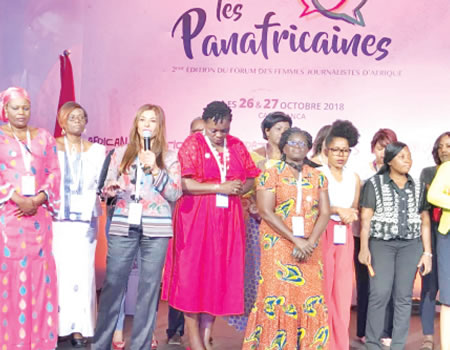
It was a mixture of rich debates, exchange of views and fun at the second edition of the “Les Panafricaines” conference, a network of female journalists across Africa with the theme “African migrations: A chance for the continent, a responsibility for the media.’’
The forum, a brain child of the 2M group brought to Casablanca over 200 women journalists from broadcast, print and online media from all 54 African countries. Among the participants were Oghogho Odubanjo and Afolasade Osigwe-Braimah of the Federal Radio Corporation of Nigeria (FRCN). They were the only participants that came from Nigeria.
The participants began their assignment on Thursday, October 25, 2018 with a visit to Morocco’s Ministry of Foreign Affairs and International Cooperation, where they had an interactive session with the Minister, Mr. Nasser Bourita.
ALSO READ: Senate ‘shut down’ in honour of 44 soldiers killed by Boko Haram
In his remarks, the minister noted that the initiative happened at the right moment – weeks away from the adoption of the Global Compact on Migration at the United Nations Heads of State and Government Summit, holding in Marrakesh in December 2018.
He added that it was crucial for Africa to be more coordinated and its media to work together to strengthen the continent. The minister stressed the need for African media to portray the image of the continent in good light, noting that Africans should be aware of their strengths in the task to develop the continent.
Participants visited the International campus in Rabat, where the Ambassador-Director of the Moroccan Agency for International Cooperation, AMCI, Mr. Mohammed Methqal took them on a tour of facilities on the Campus. He informed his visitors that the Agency had contributed to the training of about 25,000 African students in higher education in all disciplines since her establishment in 1986.
The official opening of the conference was remarkable. It was devoted to the debate on the topic “From one bank to the other, for an objective look at migrants”.
In his opening remarks, the Director General of 2M, Salim Cheikh was optimistic the forum would make it possible to treat the issue of migration better than it has been.
While declaring the conference open, Morocco’s Minister of Foreign Affairs and Cooperation, Nasser Bourita, noted there was a great need to destroy the myths surrounding the issue of migration, saying that it was erroneous to say that migrants do not bring any good to their host nations. He acknowledged the problems associated with migrants. However, he emphasized that migration was not a security problem but a human problem, adding that ‘’Morocco has never been and would never be anybody’s policeman”.
The debate featured robust discussions among the speakers comprising prominent migration experts including the head of the international Organization for Migration in Morocco, Ana Fonseca, who explained that every society must acknowledge that everybody has rights that should not be denied no matter their residency status. She said it was high-time, Africa and other global actors managed migration matters positively.
A migration specialist from Uganda, who is also a member of the Refugee Law Project in Kampala, Patrick Otim, explained that if African governments fail to provide conducive environment for their peoples, they will continue to move to other countries. He challenged the media to always do regular reports on migration issues in whatever space they occupy until the desired change is achieved.
In his submission, the founder and Editor-in-Chief of Refugee Radio Network in Germany, Larry Macaulay, charged African media to present the good side of the continent to the rest of the world. He advised Africans to be their own ambassadors by fighting tribalism and racism from the home front. He added that the media should educate and orientate their communities on migration and called for peaceful coexistence across the globe.
The president of the National Council of Human Rights, Morocco, Driss El-Yazami suggested that African countries should have ethical codes and guidelines on migration. He said journalists should be conscious of the peculiarities of each migrant in their reportage. El-Yazami emphasized the need to know the history of migration in Africa and the documentation of such reports for future generations.
Oghogho Odubanjo writes from Ibadan
A television reporter from Italy, Raffaella Maria Consentino, said negative stereotypes about migration should be tackled with facts and accurate information to be spearheaded by the media.
Speaking at the meeting, the Deputy General Manager in charge of Information and Magazines, 2M group, Samira Sitail, explained that less than 14% or about 36 million of international migrants are Africans and 80% of them are regular migrants. Samira who moderated the debate said four-fifth of the remaining 20% irregular migrants remains within the African continent. She said facts like this alter the wrong opinion and impression about African migrants.
The journalists later participated in six workshops including those on climate migration and food security, the Importance of having reliable data and Intra-African Migration – a chance for development.
After debates on various aspects of migration issues, participants through electronic voting chose women’s migration to top the agenda for the current year. Journalists’ treatment of migration issues is the second priority.
At the end of the conference three committees where inaugurated to implement and monitor the action plan for the year 2018/2019. Members are workshop leaders representing the six regions of Africa and ten Pan-Africans who occupy important positions in the African media landscape. The committees are to develop regulations and ethics and ensure compliance. They are expected to facilitate professional collaboration between countries and sharing of expertise that will benefit members of the network.
The first edition of the Les Panafricaines conference, held in Marrakech, Morocco in 2017 had only 100 participants from the 24 French speaking African countries.





